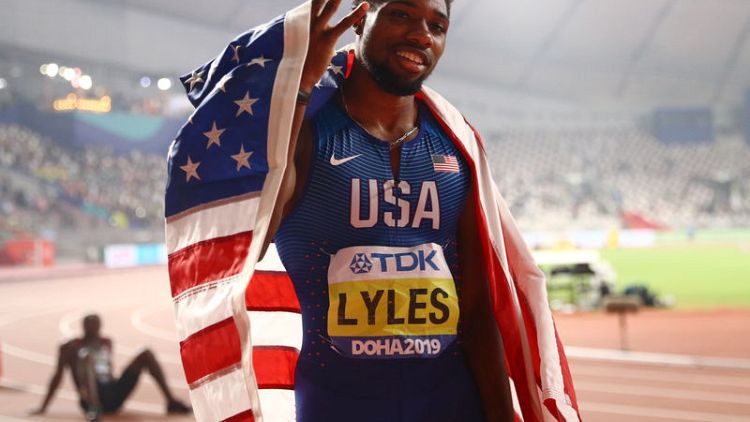By Steve Keating
DOHA (Reuters) - Noah Lyles was talking more like a labour organiser than the next Usain Bolt following his 200 metres win at the world championships, the American sprinter hinting he might be as likely to lead an athletes' union as be the face of the sport.
"I would love that (to lead an athletes' union), I think about that constantly," Lyles told Reuters. "I talk to a lot of people about that.
"It's very hard to start now since I'm just trying to build my career but it is always in the back of my head.
"I have ideas."
Unable to break free of its doping past and no obvious candidate to fill the void left by the retirement of charismatic Jamaican Usain Bolt, athletics is sorely in need of ideas and fresh thinking if it is to remain relevant.
Unionising is not a revolutionary concept. It pops up into the discussion at almost every world championships or Olympic Games.
However, the International Association of Athletics Federations (IAAF) with help from the sportswear giants like Nike and Adidas, who bankroll many areas of the sport, have managed to maintain the status quo.
As for the athletes, almost everyone agrees organising is a great idea but no one quite seems to know how to get it done.
Track and field athletes are not alone in their hopes of earning liveable wages and gaining a bigger say in how their sport works.
In North America some of the world's best women's ice hockey players have unionized (Professional Women's Hockey Players' Association) and are effectively on strike pledging not to join any professional league until an economically viable option emerges.
The U.S. women's soccer team has filed a lawsuit against the United States Soccer Federation alleging they are consistently paid less than their male counterparts. California last week signed a bill that cleared the way for college athletes to profit from brand sponsorships and endorsement deals.
With sponsorship deals, appearance money and other income spinning ventures, including rapping and modelling, the 22-year-old Lyles will not have to wonder where his next meal and rent cheque is coming from.
But for many of his fellow athletes competing in Doha, like Norwegian discus thrower Ola Stunes Isene who moved back to his parents' home because he could not make a living from the sport, the situation is much more challenging.
"I would definitely favour having more than one sponsor, not necessarily Nike," Jamaican 100 metres champion Shelly-Ann Fraser-Pryce told Reuters. "I believe the athletes should be paid more.
"The IAAF definitely makes a lot of money from these games and there are a lot of athletes that are here and not everybody goes away with something so I think we can do more to benefit the athletes."
CONTRASTING INCOMES
The main source of income for many is the Diamond League, a series of 14 meetings with stops around the globe.
Winners of Diamond League events receive $10,000 (8,122.8 pounds), down to $1,000 for the eighth-place finishers.
Gold medal winners in Doha will pocket $60,000, silver $30,000 and bronze $10,000. Eighth place finishers walk away with $4,000.
In contrast, just for stepping on the court for the opening round of the U.S. Open tennis players were guaranteed $58,000.
Track and field athletes have long sought to benefit from additional sponsorship opportunities that big events like world championships and Olympics can provide.
The IAAF council voted to permit national teams to display the logo of a national sponsor on their kit at the Doha world championships. But only 13 of more than 200 IAAF member federations have taken advantage of the opportunity.
Athletes are still prevented from negotiating their own sponsorships with many restricted by IAAF rules and contracts they sign with sportswear companies.
"Now shoe company brands bring in a lot of money but Microsoft, Apple, Coca Cola those some big hitters," said Lyles. "Verizon, what if Verizon wanted to sponsor you.
"What if Verizon said, "we want to be known as the fastest internet company and we want the fastest person to represent us.
"We are going to give you the suit, shoes, get it plastered on what you are wearing already that would be great."
